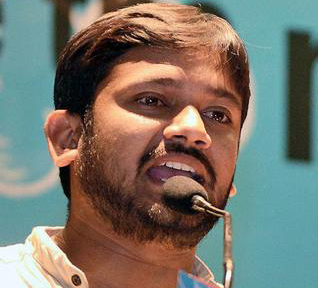Mumbai, Apr 22: Believe it or not: A Hindutva leader expressed grave concern about the treatment that will be meted out to the patients of “Dr” Kanhaiya Kumar once he completes his “doctorate”!
 The helpless media persons who had attended the press conference convened by Hindutva groups here on Thursday failed to convince the speaker Niranjan Pal, a leader of Veer Sena, that the doctorate awarded based on research (PhD) and the degree awarded based on medical studies (MBBS) are completely different.
The helpless media persons who had attended the press conference convened by Hindutva groups here on Thursday failed to convince the speaker Niranjan Pal, a leader of Veer Sena, that the doctorate awarded based on research (PhD) and the degree awarded based on medical studies (MBBS) are completely different.
Mr Pal began to question how Mr Kumar would “treat” patients, when the latter is in fact pursuing a PhD. “Kanhaiya who threatened to break the country is trying to become a doctor by completing his PhD. I do not know how will he provide service to his patients, diagnose them and carry out operations?” Mr Pal expressed his fear.
Even after being repeatedly told by the media that PhD is different from MBBS, the Hindutva leader did not realise his mistake and went on reiterating his stand.
“Kanhaiya is anti-national and he had shouted slogans against the country. We will not allow him to come to Mumbai. His rally could create law and order situation in the city and police should not give permission to his rally,” Mr Pal said.
The press conference was jointly organised by Hindu Janjagruti Samithi, Veer Sena and likeminded organisations to register their opposition to the rally of JNU Students' Union president Kanhaiya Kumar scheduled to be held in Mumbai on April 23.





Comments
We are Sure that by having Phd Doctorate Our Leader will never make an foolish attempt of treating the PHYSICALLY sick people.But we will definitely treat MENTALLY sick people,Like Niranjan Pal,Anupum Kher and so on.
Welcome to Mumbai.
How much shame for us!!! we are ruling by uneducated goons.
Why can't Kanayya ?
If uneducated leaders are becoming Home, Education, Health, HRD, LAW, Defence , PM. CM ministers etc.
Not sure if Dr. Kanhaiya Kumar can treat them but sure he has created a lot of patients
Silly to have same word for medical practitioner and a degree. Valid for a non native speaker to get confused.
Bhakts will soon be queuing up to get prescription of Burnol from Dr. Kanhaiya
\How Will Dr Kanhaiya Treat His Patients?\" Well Earned PhD in Idiotology for Sanghis"
what! Dr kannaiah he is not doctor he is antinational will be in jail forever,
all uneducated joins sangha parivar!!
liquor ban job quota mandir masjid Kanhaiya Rohit Bemula all are vote bank politics
how can anyone take names of Kanhaiya and Dr Ambedkar together. What a farce
Dr. Rakesh Sinha exposing History of Communists on the face of Kanhaiya
How will Dr Kanhaiya treat his patients?’: As if controversies surrounding Jawaharlal Nehru University.
When bhakt overanalysed \DR.\", despite informing that he is doing PhD."
These sene-ass****s are more dangerous than Kanhaiya..
How stupid people can get, simply illiterate ! ‘How will Dr Kanhaiya treat his patients?’
I don't know what is worse. Venom spewing or ignorant fool ! ‘How will Dr Kanhaiya treat his patients?’
LOL these sanghis never fail to give me a good laugh
\There is a reason why uneducated one shouldn't not be our leader. Just see Niranjan pal statement on Dr. Kanhaiya"
Funny people do funny things
he he he funny man
Pardon them Lord!!!
I thought our \Prime Servant\" ji asked this question. thank god petty hindutva leader.."
Lol...No comments
Add new comment